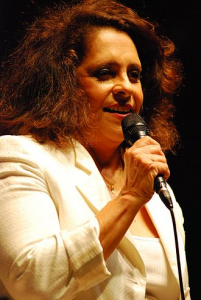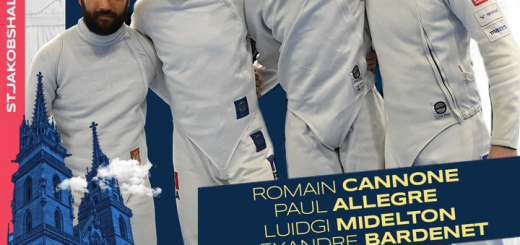GAIL COSTA nous a quittés RIP
GAIL COSTA

Gal Costa (born Maria da Graça Costa Penna Burgos, 26 September 1945 – 9 November 2022)[1] was a Brazilian singer of popular music. She was a principal figure of the tropicalia music scene in Brazil in the late 1960s and appeared on the acclaimed compilation Tropicália: ou Panis et Circenses (1968).[2]
Early life[edit]
Gal Costa was born on 26 September 1945, in the city of Salvador,[3] the capital of the state of Bahia, Brazil. Her mother, Mariah Costa Penna (deceased 1993) spent hours listening to classical music during her pregnancy in hopes that Gal would be interested in music.[citation needed] Gal’s father, Arnaldo Burgos (deceased 1960), died when Gal was 15 years old and the two never met.
At the age of 10, Gal befriended sisters, Sandra and Andréia Gadelha, the future spouses of singer-songwriters Gilberto Gil and Caetano Veloso, respectively. At 14, she first listened to João Gilberto‘s « Chega de Saudade » on the radio and became interested in Bossa Nova. She then went on to work as a clerk in Salvador’s main record store to get closer to music. At 18, she was introduced to Caetano Veloso by Andréa Gadelha, becoming close friends.
Career[edit]
Gal debuted her professional career on the night of 22 August 1964 at the concert Nós, por exemplo (We, For Example), where she performed alongside Veloso, Gil, Maria Bethânia and Tom Zé, among others. The concert inaugurated the Vila Velha Theatre in her hometown. During the same year, she also performed in Nova Bossa Velha, Velha Bossa Nova (New Old Wave, Old New Wave), at the same place and with the same singing partners. She then left Salvador to live in the house of her cousin Nívea in Rio de Janeiro, following in the footsteps of Bethânia, whose concert Opinião (Opinion) had become a huge hit there.

Gal Costa, 1969. National Archives of Brazil
Gal’s first professional recording happened on Bethânia’s debut album, released in 1965. It was the duet « Sol Negro » (Black Sun) written by Bethânia’s brother, Caetano Veloso. She then released her first singles through RCA Records, « Eu vim da Bahia », written by Gil, and « Sim, foi você », written by Veloso. The following year Gal met Gilberto personally and participated in TV Rio’s 1st International Music Festival performing « Minha Senhora », written by Gil and Torquato Neto. It failed to captivate the Festival’s audience.
Gal’s first album Domingo was released in 1967 through Philips Records. It was also Veloso’s debut. Gal stayed on the label, which later became PolyGram, until 1983. One song released from this album, « Coração Vagabundo », became a huge hit. The same year, Gal also performed two songs on the 2nd International Music Festival, which was then hosted by Rede Globo. They were « Bom Dia », written by Gil and Nana Caymmi, and « Dadá Maria », written by Renato Teixeira. The latter was performed with Sílvio César at the Festival and with Teixeira on the recording.
In 1968, Gal became a part of the tropicália movement. Tropicalia is a mix of Samba, Bossa Nova and modern genres like rock and beat.[4] She recorded four songs on Tropicália: ou Panis et Circenses. They were « Mamãe coragem », written by Veloso and Torquato Neto, « Parque industrial », by Tom Zé, « Enquanto seu lobo não vem », by Veloso, and « Baby », also by Veloso. The latter became Gal’s first nationwide solo hit, becoming a classic of Brazilian popular music. The same year, she participated in the 3rd International Music Festival, performing « Gabriela Mais Bela », written by Roberto and Erasmo Carlos. In November, she participated in Rede Record‘s 4th Music Festival, performing the song « Divino Maravilhoso », by Gil and Veloso. The song also became a nationwide hit and a classic song of popular music. When Gilberto Gil and Caetano Veloso were living in exile in London, she would visit them and keep performing their music, but stayed in Brazil.[2]
In 1969, Gal released her eponymous solo debut album,[2] which included « Baby » and « Divino Maravilhoso ». The album is considered a Tropicalismo classic, balanced between Brazilian stylizations and North American psychedelic influences. It also featured Gal’s third and fourth solo hits, Jorge Ben Jor‘s « Que pena (Ele já não gosta mais de mim) » and Veloso’s « Não identificado », respectively. In the same year, she recorded her second solo album, titled Gal, and featuring the hits « Meu nome é Gal », by Roberto and Erasmo Carlos, and « Cinema Olympia », by Veloso. The album served as the basis for the repertoire of the concert Gal!
Her next album, Legal, was not as far from the mainstream as its predecessor, and a live album the following year again balanced smooth Brazilian sounds with heavy rock. In 1973, the cover of Costa’s album Índia was censored[5] — it focuses on her red bikini bottom. Gal has recorded songs composed by a number of Brazil’s most popular songwriters such as Tom Jobim, Ben and Erasmo Carlos. In 1982 the single « Festa Do Interior » from the double album Fantasia became her biggest ever hit, going multi-platinum by the end of the year. Gal appeared in the 1995 film The Mandarin (O Mandarim) as the singer Carmen Miranda. She has recorded songs in Portuguese, Spanish and English.
Gal Costa is portrayed by Sophie Charlotte in the 2023 biographical film Meu nome é Gal.[6]
Awards[edit]
2011 Latin Grammy Lifetime Achievement Award[3]
Personal life[edit]
Gal was bisexual. She was enamoured of Marina Lima in the 1990s.[7]
Death[edit]
Gal died in São Paulo on 9 November 2022, at the age of 77.[8] She was recovering from an extraction of a nodule of her nasal cavity and had canceled her show at the Primavera Sound.[9]
Discography[edit]
Studio albums[edit]
- 1965: Maria da Graça (EP)
- 1967: Domingo (with Caetano Veloso)
- 1969: Gal Costa
- 1969: Gal
- 1970: Legal
- 1971: -Fa-Tal- Gal a Todo Vapor
- 1973: Índia
- 1974: Cantar
- 1975: Gal Canta Caymmi
- 1977: Caras e Bocas
- 1978: Água Viva
- 1979: Gal Tropical
- 1980: Aquarela do Brasil
- 1981: Fantasia
- 1982: Minha Voz
- 1983: Baby Gal
- 1983: Trilha Sonora do Filme ‘Gabriela’
- 1984: Profana
- 1985: Bem Bom
- 1987: Lua de Mel Como o Diabo Gosta
- 1990: Plural
- 1992: Gal
- 1994: O Sorriso do Gato de Alice
- 1995: Mina D’Água do Meu Canto
- 1998: Aquele Frevo Axé
- 2001: Gal de Tantos Amores
- 2002: Gal Bossa Tropical
- 2004: Todas as Coisas e Eu
- 2005: Hoje[10]
- 2011: Recanto
- 2015: « Estratosférica »
- 2018: « A Pele do Futuro »
- 2021: « Nenhuma Dor »
Live albums[edit]
- 1971: -Fa-Tal- Gal a Todo Vapor
- 1976: Doces Bárbaros (with Caetano Veloso, Gilberto Gil, and Maria Bethânia)
- 1986: Jazzvisions: Rio Revisited (with Antonio Carlos Jobim)
- 1997: Acústico MTV
- 1999: Gal Costa Canta Tom Jobim Ao Vivo
- 2006: Gal Costa Live at the Blue Note
- 2006: Gal Costa Ao Vivo
- 2013: Recanto Ao Vivo
Singles[edit]
- 1968: « Baby »
- 1969: « Que Pena (Ela Já Não Gosta Mais De Mim) »
- 1970: « Meu Nome É Gal »
- 1970: « London, London »
Selected filmography[edit]
| Year | Film | Role | Notes |
|---|---|---|---|
| 1995 | O Mandarim | Carmen Miranda | |
| 2017 | O Nome Dela é Gal | Biography docu-series produced by HBO Latin America |
Bibliography[edit]
- De Stefano, Gildo, Il popolo del samba, La vicenda e i protagonisti della storia della musica popolare brasiliana, Preface by Chico Buarque de Hollanda, Introduction by Gianni Minà, RAI-ERI, Rome 2005, ISBN 8839713484
- De Stefano, Gildo, Saudade Bossa Nova: musiche, contaminazioni e ritmi del Brasile, Preface by Chico Buarque, Introduction by Gianni Minà, Logisma Editore, Firenze 2017, ISBN 978-88-97530-88-6
References[edit]
- ^ https://www.infobae.com/america/
- ^ Jump up to:a b c Gotrich, Lars (9 November 2022). « Gal Costa, piercing voice of Brazil’s Tropicália movement, has died at 77 ». NPR. Retrieved 9 November 2022.
- ^ Jump up to:a b Charner, Flora (9 November 2022). « Legendary Brazilian singer Gal Costa died on Wednesday at the age of 77 ». CNN. Retrieved 9 November 2022.
- ^ « Im Alter von 77 Jahren: Brasilianische Musiklegende Gal Costa gestorben ». FAZ.NET (in German). ISSN 0174-4909. Retrieved 9 November 2022.
- ^ cover of Gal Costa’s album Índia
- ^ « ‘Meu nome é Gal’: filme sobre Gal Costa tem Sophie Charlotte como protagonista e estreia em 2023 ». Diário do Nordeste (in Brazilian Portuguese). 9 November 2022. Retrieved 9 November 2022.
- ^ « Os amores de Gal Costa, que era abertamente bissexual ». iG (in Brazilian Portuguese). 9 November 2022. Retrieved 9 November 2022.
- ^ « Gal Costa (1945 – 2022) – Morre Gal Costa, uma das maiores vozes da música brasileira, aos 77 anos ». Folha de S.Paulo (in Brazilian Portuguese). 9 November 2022. Retrieved 9 November 2022.
- ^ Gual, Joan Royo (9 November 2022). « Muere a los 77 años Gal Costa, una de las grandes voces de la música brasileña ». El País (in Spanish). Retrieved 9 November 2022.
- ^ Billboard – 21 October 2006 – Page 68 « Camargo Mariano’s production output for the year was slim: He is entered only for Gal Costa’s « Hoje, » an album that hasn’t been released in the United States. »
External links[edit]
- Official website (in Portuguese)
- Official Argentinian website (in Spanish and Portuguese)
- Gal Costa at AllMusic
- Gal Costa discography at Discogs
- Gal Costa at IMDb
- Gal Costa at Slipcue.com – English-language discography with reviews
- Gal Costa at kellerjazz.com – photo collection
- Recent deaths
- 1945 births
- 2022 deaths
- Brazilian mezzo-sopranos
- Bossa nova singers
- Música Popular Brasileira singers
- Tropicália
- Brazilian people of Spanish descent
- People from Salvador, Bahia
- Wrasse Records artists
- 20th-century Brazilian women singers
- 21st-century Brazilian women singers
- 21st-century Brazilian singers
- Recipients of the Order of Cultural Merit (Brazil)
- Women in Latin music
- Bisexual musicians
- Bisexual women
- 20th-century LGBT people
- 21st-century LGBT people
- LGBT artists from Brazil



